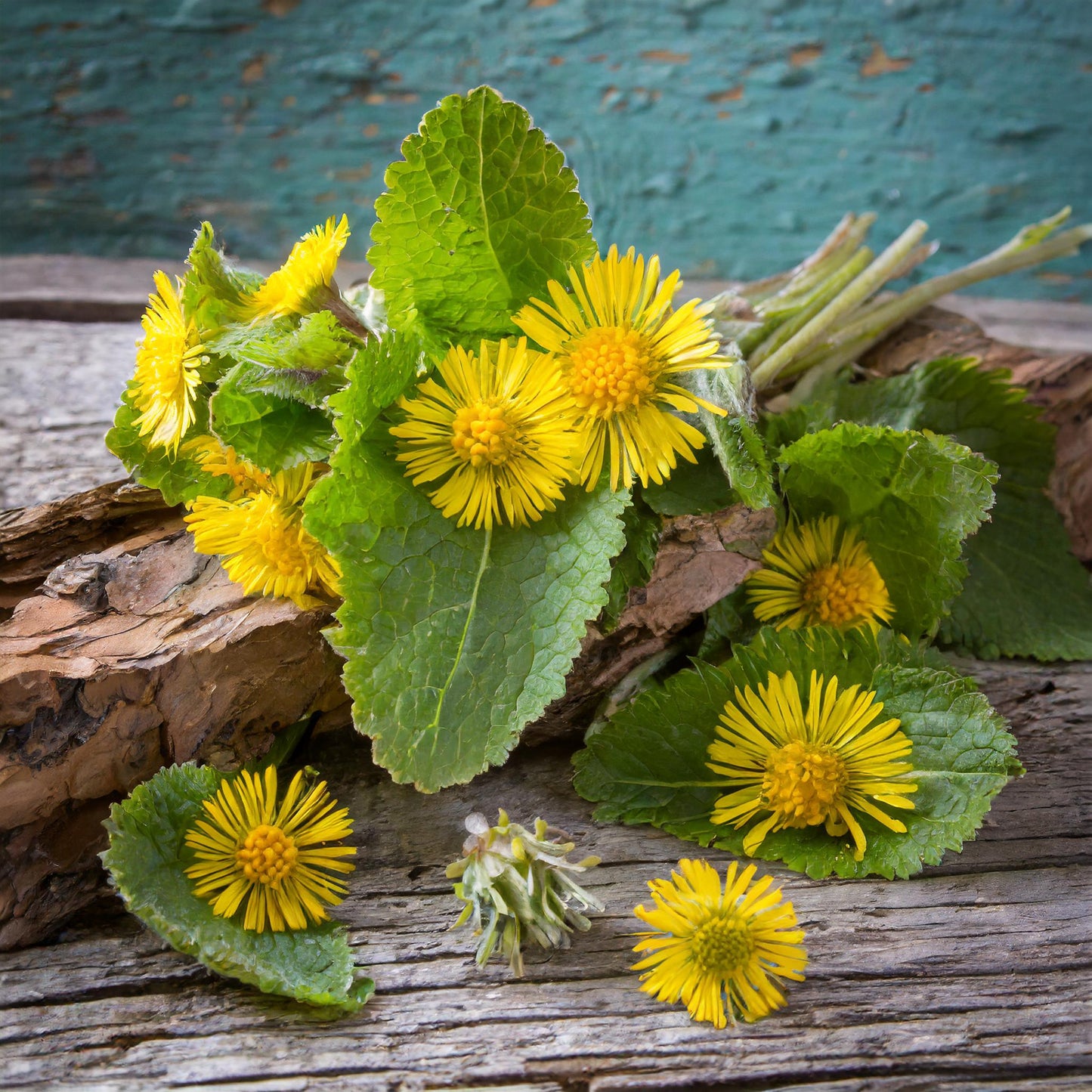Botanical Sage
Coltsfoot Cut
Coltsfoot Cut
Couldn't load pickup availability
Coltsfoot (Tussilago farfara) is a perennial herb native to Europe and parts of Asia, historically used in traditional medicine for various medicinal purposes. Here are some of the medicinal uses and health benefits associated with coltsfoot:
-
Respiratory Health: Coltsfoot has long been used to relieve respiratory ailments such as coughs, bronchitis, asthma, and sore throat. Its expectorant properties help to loosen and expel mucus from the respiratory tract, making it easier to breathe.
-
Cough Suppressant: Coltsfoot contains mucilage, a gel-like substance that coats and soothes the throat, providing relief from coughing and irritation. It is commonly used in herbal cough syrups and lozenges.
-
Anti-inflammatory Effects: Coltsfoot has anti-inflammatory properties that can help reduce inflammation in the respiratory system and other parts of the body. It may be beneficial for conditions such as arthritis and inflammatory bowel disease.
-
Bronchodilator: The active compounds in coltsfoot can help relax and widen the airways, making it easier for individuals with asthma or chronic obstructive pulmonary disease (COPD) to breathe.
-
Antioxidant Effects: Coltsfoot contains antioxidants that help neutralize free radicals and reduce oxidative stress in the body. Antioxidants play a crucial role in protecting cells from damage and preventing chronic diseases.
-
Mucolytic Properties: Coltsfoot contains compounds that have mucolytic properties, meaning they can break down and thin mucus, making it easier to expel from the body. This can be beneficial for individuals with respiratory conditions characterized by thick, stubborn mucus.
-
Skin Health: Coltsfoot has been used topically to soothe and heal various skin conditions, including wounds, burns, eczema, and insect bites. Its anti-inflammatory and emollient properties help reduce inflammation and promote skin regeneration.
-
Urinary Tract Health: Coltsfoot has diuretic properties that can increase urine production and promote the elimination of toxins from the body. It may help relieve urinary tract infections (UTIs) and reduce water retention.
Forms and Usage
- Tea: Coltsfoot tea can be made by steeping dried coltsfoot leaves or flowers in hot water for 10-15 minutes. This tea can be consumed several times a day to relieve respiratory symptoms or soothe the throat.
- Tincture: Coltsfoot tincture is a concentrated liquid extract of the herb. It can be taken orally by adding a few drops to water or juice, following the dosage instructions on the product label.
- Capsules: Coltsfoot capsules or tablets are available for those who prefer a convenient dosage form. Follow the recommended dosage on the product label or consult with a healthcare professional.
- Topical Applications: Coltsfoot oil or ointment can be applied topically to the skin to soothe irritation, inflammation, and minor wounds.
Precautions and Side Effects
- Liver Toxicity: Coltsfoot contains pyrrolizidine alkaloids (PAs), compounds that can be toxic to the liver in large amounts. Long-term or excessive use of coltsfoot may increase the risk of liver damage. It's advisable to use coltsfoot products sparingly and for short durations.
- Pregnancy and Breastfeeding: Pregnant and breastfeeding women should avoid using coltsfoot due to the potential risk of liver toxicity and harm to the developing fetus or newborn.
- Allergic Reactions: Some individuals may be allergic to coltsfoot or other plants in the Asteraceae family. Discontinue use and seek medical attention if allergic reactions occur, such as itching, rash, or difficulty breathing.
- Interaction with Medications: Coltsfoot may interact with certain medications, including blood thinners and medications metabolized by the liver. Consult with a healthcare professional before using coltsfoot if you are taking any medications.
Conclusion
Coltsfoot offers a variety of medicinal benefits, particularly for respiratory health, cough relief, and skin conditions. It can be used in various forms, including teas, tinctures, capsules, and topical preparations, to address different health concerns. As with any herbal remedy, it's important to use coltsfoot appropriately and cautiously, especially considering its potential for liver toxicity and interactions with medications. Consult with a healthcare professional before using coltsfoot, especially if you have underlying health conditions or concerns.


